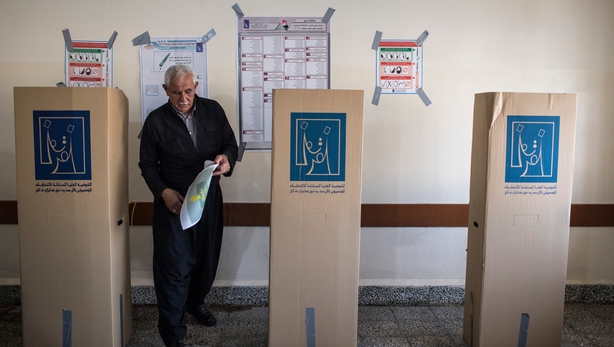Iraqis have voted in the first parliamentary election since the defeat of so-called Islamic State, with Prime Minister Haider Abadi, a rare ally of both the United States and Iran, trying to fend off powerful Shia groups that would pull the country closer to Tehran.
Iraqis expressed pride at the prospect of voting for the fourth time since the fall of dictator Saddam Hussein, but also said they had scant hope that the election would stabilise a country beset by conflicts, economic hardship and corruption.
Polling stations closed at 6pm (3pm Irish time).
Reporters at polling stations in several cities said voter turnout appeared to be about 30%, citing sources in provincial offices of the Independent High Electoral Commission.
Turnout in the 2014 vote was about 60%.
Voters will pass their verdict on Mr Abadi, who has achieved the delicate task of maintaining relationships with both of Iraq's main allies who are otherwise arch enemies: Iran and the United States.
Whoever wins the election will have to contend with the fallout from US President Donald Trump's decision to pull out of a nuclear deal with Iran, a move Iraqis fear could turn their country into a theatre of conflict between Washington and Tehran.
Mr Abadi, who came to power four years ago after Islamic State seized a third of the country, received US military support for Iraq's army to defeat Islamic State even as he gave free rein to Iran to back Shia militias fighting on the same side.
Now that the military campaign is over however, he faces political threats from two main challengers: his predecessor Nuri al-Maliki, and the leader of the main Shia paramilitary group, Hadi al-Amiri, both closer than he is to Iran.

Iraq remains divided among its three main ethnic and religious groups.
Past election outcomes have hinged on whether leading Shia parties could obtain enough seats to marginalise the other groups.
Iran has wide sway in Iraq as the primary Shia power in the region.
But the United States, which invaded Iraq in 2003 to topple Saddam, occupied it until 2011 and sent troops back to help fight Islamic State in 2014, also has deep influence.
Mr Abadi is seen as the narrow frontrunner, but victory is far from certain.
A British-educated engineer with no powerful political machine of his own when he took office, he solidified his standing with the victory over Islamic State.
Although he has failed so far to improve the limping economy, his supporters say he is best placed to keep more overtly sectarian political leaders in check.
Even if Mr Abadi's Victory Alliance wins the most seats, he still must negotiate a coalition government, which must be formed within 90 days of the election.
One of his principal rivals, the 63-year-old Amiri, spent more than two decades fighting Saddam from exile in Iran and leads the biggest group of volunteer forces that fought Islamic State.
Victory for Mr Amiri would be a clear win for Iran.

